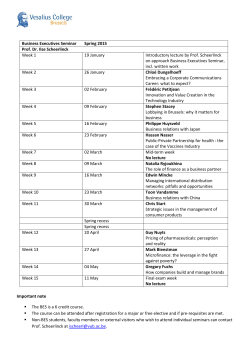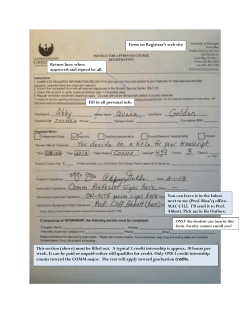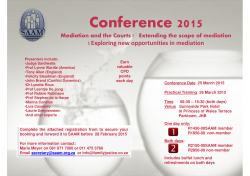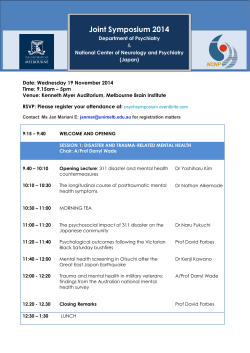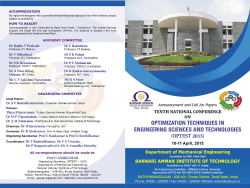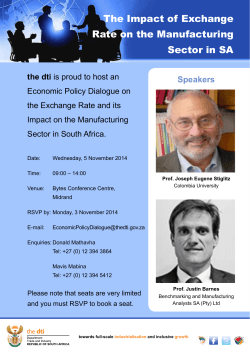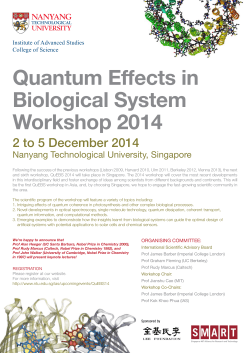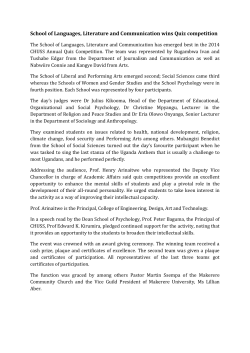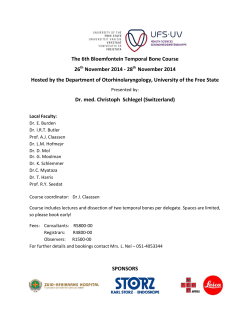
THE REALITY OF THE CITY
20th-21st February 2015 Friday 9.30-18.30 h. Saturday 9.30-12.30 h. Politecnico di Torino Castello del Valentino Sala dello Zodiaco Viale Mattioli 39 10125 Torino Please confirm your participation: grantorinograduation@gmail.com Organization: Politecnico di Torino Department of Architecture and Design University of Technology, Eindhoven Faculty of The Built Environment Scientific Board Dipl.-Ing. Haike Apelt, TU Eindhoven Prof. Dr. Bernard Colenbrander, TU Eindhoven Prof. Dr. Silvia Malcovati, Politecnico di Torino Prof. Dr. Fritz Neumeyer, Em. TU Berlin Prof. Christian Rapp, TU Eindhoven THE REALITY OF THE CITY Students Bordian, Anastasia Bosman, Koen Gelzinyte, Domile Kaathoven, Bram van Linde, Jos van der Roeleveld, Jaap Simons, Jeroen Wehr, Dorota Continuity and Change in Urban Architecture Lessons from the Seventies Delia, Antonello Matta, Alberto Lulja, Kejdi Palandri, Francesca Penna, Lorenzo Rigas, Elena Santanera, Nison Bacilieri Zedda, Ilaria Maria 20th-21st February 2015 Friday 9.30-18.30 h. Saturday 9.30-12.30 h. with the participation of Politecnico di Torino Castello del Valentino Sala dello Zodiaco Viale Mattioli 39 10125 Torino Friday 20th February 2015 Castello del Valentino Sala dello Zodiaco Introduction 9.30 Prof. Rocco Curto, Director of the DAD 9.40 Prof. Dr. Silvia Malcovati, Politecnico di Torino Lectures Morning Moderation: Dipl.-Ing. Haike Apelt,TU Eindhoven 10.00 10.30 11.00 Prof. Dr. Bernard Colenbrander, TU Eindhoven Prof. Christian Rapp, TU Eindhoven Prof. Luigi Snozzi, University of Sassari 11.30 Coffee break 12.00 Prof. Hans Kollhoff, Em. ETH Zürich 12.30 Prof. Carlo Moccia, Politecnico di Bari 13.00 Lunch Lectures Afternoon Moderation: Dr. Arch. Giulia Perona, Politecnico di Torino 14.30 15.00 15.30 16.00 Prof. Dr. Fritz Neumeyer, Em. TU Berlin Prof. Uwe Schröder, RWTH Aachen Prof. Andreas Hild, TU München Coffee break Talks 16.30 Prof. Dr. Bernard Colenbrander, TU Eindhoven talks with: Prof. Christian Rapp, TU Eindhoven Prof. Andreas Hild, TU München 17.15 Prof. Dr. Silvia Malcovati, Politecnico di Torino talks with: Prof. Hans Kollhoff, Em. ETH Zürich Prof. Luigi Snozzi, University of Sassari 18.00 Prof. Dr. Fritz Neumeyer, Em. TU Berlin talks with: Prof. Uwe Schröder, RWTH Aachen Prof. Carlo Moccia, Politecnico di Bari Final discussion 18.30 Panel discussion with Prof. Lorena Alessio, Roberta Ingaramo, Matteo Robiglio, Marco Trisciuoglio, Politecnico di Torino Saturday 21st February 2015 Castello del Valentino Sala delle Colonne 9.30-12.30 Exhibition of the Gran Torino Atlas Short presentation of the students taking part in the graduation studio Gran Torino 2014-2015 and discussion with the participants of the symposium. THE REALITY OF THE CITY Continuity and Change in Urban Architecture Lessons from the Seventies Architecture can be seen as a cultural production rooted in history as well as in the reality of its own time, giving form to collective ideas and values. Nevertheless, through the principles of architectural form, architecture creates a reality of its own, the human habitat. As a collective art, architecture not only organizes the reality of public and privates spaces; as a formal reality of its own, it also acts as the symbolical expression of social life. The rules of architecture emerge within the confrontation of the concept with the conditions of the real givens (like urban context, program or material) and are contained within its own tradition (“L’architettura sono le architetture”, as Giorgio Grassi has put it), to which each new work is contributing. Architectural reality is related to outer-architectural aspects as well as to the inner-architectural reality of the work itself. If the double aim of architecture should be "to allow and to resist", its productivity would depend on the confrontation of both realities. This remains true in particular for urban architecture in its conflict between autonomy and contextuality. The question, how this (supposed) conflict gets resolved in the actual work, remains always open to discussion. The urban reality of architecture therefore is not founded in a platonic idea of the city as intellectual construct, but rather in an understanding of the historical and cultural development and the physical concreteness of the city connected to social life. The invited architects are asked to explain their relation towards urban reality through their own projects, thereby pointing out specific problems for the theoretical discussion, starting from the cultural heritage of the Seventies.
© Copyright 2025
